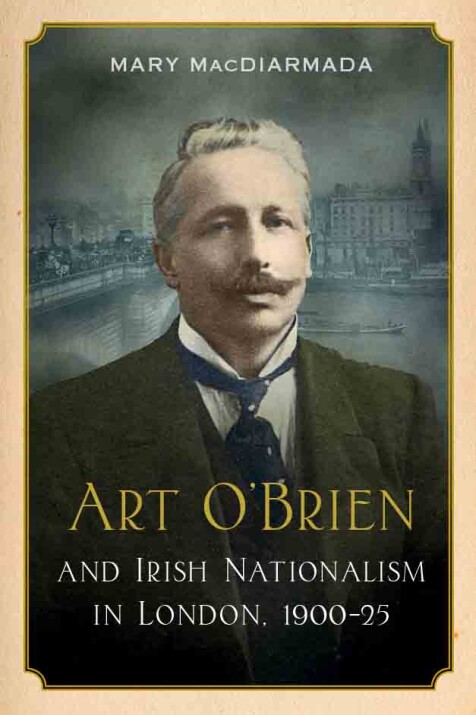Art O'Brien and Irish Nationalism in London, 1900-25
Dr Mary MacDiarmada
The panel commended the author for addressing a significant lacuna in the historiography of the Irish revolutionary period. The panel applauded the author’s especially effective sketching of O’Brien’s personality, noting the work was clearly and accessibly written, without downplaying the complexity of the issues that shaped O’Brien’s world. The panel enjoyed the lively, readable style of the writing and considered the work to be a wide-ranging study of the Irish independence movement, which makes a significant contribution to scholarship on the political context of the Irish Diaspora in Britain and Anglo-Irish affairs in the early twentieth century. (The NUI Publication Prize in Irish History Judging Panel)
“Ireland’s current “Decade of Commemorations” has arguably been the most comprehensive and wide ranging exercise in Irish national self-reflection. Despite some understandable concerns about how it might unduly affect current British-Irish relations, particularly in regard to the centenary of the Easter Rising, it has proved to be a genuinely engaging, revealing and educational experience for not just scholars and students of Irish history, but for citizens more generally of both countries. By bringing a wealth of fresh research and often provocative new critical perspectives to bear on the years between 1912-1923, this plethora of events, debates and publications has reinformed and reinvigorated our understanding of a defining period of Anglo-Irish history ... This book is a vital and welcome contribution to this process. As its title suggests, it serves a dual purpose. On the one hand, it is a biography of one of the most important figures in London Irish cultural and political life in the early twentieth century, and, on the other, it is an examination of the considerable influence the Irish in London had on Anglo-Irish affairs at this time. This is an ambitious undertaking and one which could easily have fallen between these proverbial stools. Instead, it succeeds admirably in both objectives through a skillful feat of mutual contextualization. [It is] an impeccably referenced book with an extensive bibliography and high-quality photographic plates. [Art O’Brien] was the political lynchpin of Irish London for the duration of the revolutionary period. From the late 1890s onwards, he became involved in numerous Irish organizations in the city, invariably in senior positions, including the Gaelic League, Sinn Féin, the Irish Volunteers, the Irish National Relief Fund and the Irish Self-Determination League of Great Britain. To quote the Old Bailey judge who convicted him of seditious conspiracy in 1923, he was “the rallying point, the central figure, the presiding genius of the whole republican movement in Britain” (15). MacDiarmada is able to use O’Brien’s life, therefore, as the hook on which to hang an exceedingly well researched account of how advanced Irish nationalism manifested itself in London through an array of organizations of varying political and cultural hue and influence … The author of this important book leaves the reader in no doubt that Art O’Brien was a pivotal and powerful figure who held a key position at a major turning point in Irish history. One cannot but admire O’Brien’s indefatigable commitment to the cause of Irish freedom and to the cultural needs of his peer community in Britain. His unstinting work on behalf of Irish prisoners and their families on both sides of the Irish Sea was a selfless and admirable achievement as was his masterful handling of the propaganda campaign around the hunger strike and eventual death of Terence MacSwiney … We owe Mary MacDiarmada a major debt of gratitude for the time and dedication she has devoted to this study. Exhaustive and authoritative, it will serve as a key reference for the history of the Irish in Britain and Anglo-Irish affairs for decades to come. Moreover, unlike some monographs published in the wake of PhD theses, it will also appeal beyond a strictly academic readership as an object lesson in how to employ an engaging and lucid personal biography to illuminate an overlooked aspect of a nation’s history.” Tony Murray, Irish Literary Supplement, Fall 2021
“Art O’Brien has been one of the mystery figures of the Irish nationalist struggle of the early 1920s. O’Brien is referred to repeatedly in histories of the Anglo-Irish War, as Mary MacDiarmada notes in Art O’Brien and Irish Nationalism in London, 1900–25, because his papers in the National Library of Ireland constitute the most extensive collection of correspondence between key figures in the conflict from 1919 to 1921. But who was Art O’Brien? He was not involved in 1916, not elected to the Dáil, not in the government, not executed by the British or the Irish Free State. MacDiarmada has written the first full biography of this Londoner who was active in, indeed central to, Irish affairs from 1900 to his death in 1949 ... MacDiarmada provides a balanced assessment of O’Brien, a central figure in Irish affairs in London in a most critical time. She acknowledges his energy, devotion, and administrative skills. His business and international connections, his language skills, and his personal knowledge of Irish political figures, made him very effective in promoting Irish needs. O’Brien got things done. But she admits that he was, ‘a perfectionist who did not suffer fools gladly and who had a highly inflated sense of his own importance’ (200). In short, he was difficult to work with and made enemies. He was certainly distinctive in being someone not actually native to Ireland who played such a central role in Irish affairs for almost forty years. MacDiarmada has brought into the light this shadowy figure and in doing so has explained the importance of both Art O’Brien and the London Irish in the history of the Irish nationalist struggle." Francis M. Carroll Journal of British Studies (jbr.2020.227)
“Shedding light on the work of the ‘presiding genius’ of the Irish movement in London [this] publication of Art O’Brien and Irish Nationalism in London 1900-25 by Dr Mary MacDiarmada is a long overdue biography of one of the most fascinating characters of the Irish revolution ... The author concludes that O’Brien’s role between 1916 and 1921 is ‘grossly underestimated’ and makes a compelling case for this claim ... no revolutionary figure left such a huge archive of material for future historians and the Art O’Brien collection in the National Library is one of the most comprehensive you will find from this period ... When he died, de Valera said of him: ‘There was never a man who was more whole-heartedly or more self-sacrificingly loyal to Ireland and to the course of the Irish language and Irish independence.’” Ronan McGreevy (Irish Times, October 2020).
"MacDiarmada is to be commended for the particular skill with which she has restored O'Brien to the stage: this is a diligently researched and elegantly written study. Like all the best biographies, hers succeeds in illuminating both an individual portrait and a wider landscape ... A highly valuable addition to both the wider pre-history of the Revolution and the climactic crisis of late 1921." Tim Wilson (Irish Political Studies, November 2020).
“Prior to the publication of this book, Art O’Brien was not as well-known as he should have been ... this book is to be welcomed as it shines a spotlight on this unique individual who played an important role in Irish history … given his long-running connection to so many different Irish organisations and causes and his high-level involvement in the Irish revolution, the book will appeal to a wide audience”. Oliver O’Hanlon, Irish Studies Review 29:3


